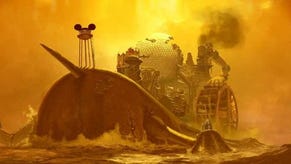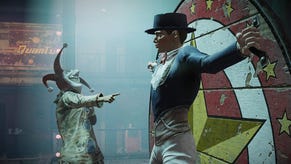Spector: what Ebert thinks is "irrelevant"
"He doesn't get it."
Deus Ex creator Warren Spector has called film critic Roger Ebert's view that videogames can never be art "irrelevant".
Spector, who's in charge of Wii exclusive Disney Epic Mickey, said of the Chicago-based journalist: "He doesn't get it."
In April Ebert once again hit the headlines for weighing in on the eternal "games as art" debate.
He wrote a stinging blog post entitled: "Videogames can never be art."
"One obvious difference between art and games is that you can win a game. It has rules, points, objectives, and an outcome. Santiago might cite an immersive game without points or rules, but I would say then it ceases to be a game and becomes a representation of a story, a novel, a play, dance, a film. Those are things you cannot win; you can only experience them."
Earlier this month he followed up his post, which attracted over 4500 comments, mostly critical, with a more sedate comment.
"My error in the first place was to think I could make a convincing argument on purely theoretical grounds. What I was saying is that videogames could not in principle be Art. That was a foolish position to take, particularly as it seemed to apply to the entire unseen future of games. This was pointed out to me maybe hundreds of times. How could I disagree? It is quite possible a game could someday be great Art."
For Spector, though, Ebert's opinion is moot.
"If we haven't already won, we're inevitably going to win," he told Eurogamer in an interview published elsewhere on the site.
"Videogames are just coming out of the period where I describe them as the medium adults don't get. Roger Ebert is like the adult. He doesn't get it.
"The fact is if we haven't already reached the point where this is true, we're very close to reaching the point where everyone plays games, in the same way that everyone goes to the movies and everyone watches television. We're really at that sort of point where everybody plays games.
"As younger people grow up and as twenty-somethings have kids and they start gaming – it's not like the twenty-somethings are going to stop playing games when they get to thirty, forty and fifty. We're becoming a mainstream medium where everybody plays.
"Eventually some other thing will come along that I don't get or you don't get and we'll all say, 'Oh, those kids today, that stuff isn't art.' The same thing happened with movies. Go back to the early days of movies. Go back to the early days of the novel, for crying out loud. That can't be art. Go back to the days when people gave Shakespeare a hard time.
"Whatever medium adults don't understand can't be art. Eventually those adults go away and new adults take their place, and some other medium takes the place of the thing that everybody hates. We're coming out of that period now. What Roger Ebert thinks is completely irrelevant."
Spector isn't the first creator to hit back at Ebert's thoughts on videogames.
In 2007 Ebert had a very public spat with novelist and director Clive Barker, who said: "It's evident that Ebert had a prejudiced vision of what the medium is, or more importantly what it can be."
"We can debate what art is, we can debate it forever. If the experience moves you in some way or another... Even if it moves your bowels... I think it is worthy of some serious study."
That prompted a response from Ebert, who said: "The word 'prejudiced' often translates as 'disagrees with me'. I might suggest that gamers have a prejudiced view of their medium, and particularly what it can be.
"Games may not be Shakespeare quite yet, but I have the prejudice that they never will be, and some gamers are prejudiced that they will."
Last year immensely successful Hollywood composer Hans Zimmer said he considered games to be as legitimate an art form as films and theatre.
"When movies first came out, maybe they were in black and white and there wasn't any sound and people were saying the theatre is still the place to be. But now movies and theatre have found their own place in the world. They are each legitimate art forms.
"And now this new thing, it's interesting," he added. "We still call it a game. The word has a slightly sort of downmarket quality, that word. It is a trivial word."








.png?width=291&height=164&fit=crop&quality=80&format=jpg&auto=webp)
